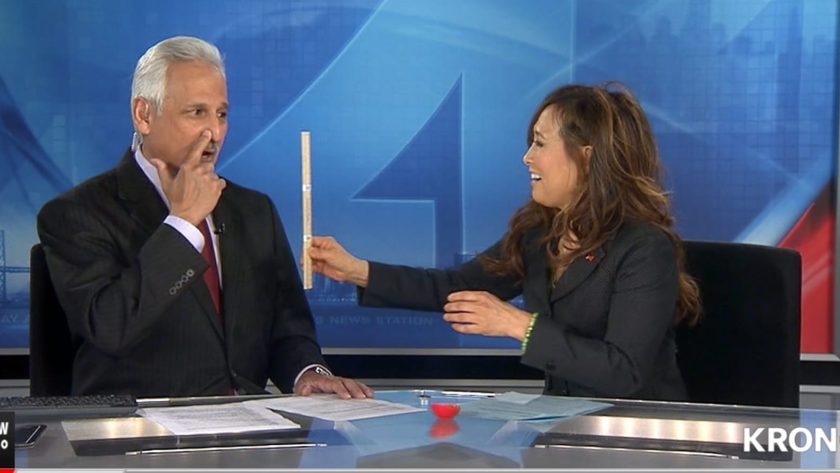A simple smell test could provide a quick and inexpensive way to identify those at high risk for Alzheimer’s and Parkinson’s. Weekend anchor Marty Gonzalez on KRON 4 Morning News Weekend is a willing test subject for the Alzheimer’s peanut butter test.
Why the Smell Test Is Significant
Worldwide, nearly 44 million people have Alzheimer’s disease or a related form or dementia, but only 1 in 4 people with the disease is diagnosed.
- Loss of the sense of smell may indicate the brain is losing its ability to self-repair
- Parkinson’s disease: Over 90% report some level of an inability to smell.
- Moderate to severe Alzheimer’s: Nearly 100% have impaired smell.
Smell Test Protocol
Testing for Alzheimer’s disease or other dementias can be time-consuming, costly and invasive. In contrast, this University of Florida study used a simple peanut butter test:
- Patient: Closed his/her eyes and mouth. Then blocked one nostril.
- Clinician: Opened the peanut butter container (one tablespoon).
- Clinician: Held the ruler next to the open nostril while the patient breathed normally.
- Clinician: Moved the peanut butter up the ruler one centimeter at a time during the patient’s exhale until the person could detect an odor.
- Clinician: Recorded the distance.
- After 90 seconds, the procedure was repeated on the other nostril.
Left-Right Asymmetry
 The study revealed dramatic differences between the left and right nostril in patients with early stage Alzheimer’s disease.
The study revealed dramatic differences between the left and right nostril in patients with early stage Alzheimer’s disease.- In patients with other kinds of dementia, there were either no differences in odor detection between nostrils or the right nostril was worse at detecting odor than the left one.
- When smelling the peanut butter, the left nostril in the Alzheimer’s patients could not detect the smell of the peanut butter until it was an average of 10 centimeters (about 4 inches) closer to the nose than the right nostril had detected the smell.
*A normally functioning olfactory nerve can detect odors at about 20 centimeters (about 8 inches) from the test agent.
See your physician if you lose your sense of smell.
Validated Five-Item Test for Dementia
In University of Chicago Medical Center study, nearly 3,000 adults, aged 57 to 85, had to identify five odors (peppermint, fish, orange, rose, and leather).
During a five-year follow-up, those that could not identify at least four out of the five odors were found to be more than twice as likely to develop dementia.
The smell test marks someone who needs closer monitoring and further testing.
Scratch-and-Sniff Test for Parkinson’s Disease
In a study led by a Michigan State University Medical Center researcher, people with a poor sense of smell were nearly five times more likely to develop Parkinson’s disease (PD) than people with a good sense of smell.
The test involved smelling 12 common odors, such as cinnamon, lemon, gasoline, soap, and onion. Among Parkinson’s patients, the loss of smell often occurred several years before signs of tremors.
Distinct Pattern of Impaired Smell in Parkinson’s
Rather than test for general olfactory function, another study suggests a distinct olfactory pattern in people with PD. The University of Pennsylvania devised the 12-item Brief Smell Identification Test (B-SIT).
In this study published in JAMA Neurology, they found the ability to identify specific odors (wintergreen, pizza, pineapple, anise seed, and licorice) was highly compromised in patients with Parkinson’s disease. However, in contrast, they could still identify odors of orange and clove.
Your Sense of Smell
If you’re unable to smell, you can’t smell things that you enjoy (like your morning coffee, favorite meal, or spring flowers). You not only lose one of the simple pleasures in life, but you also lose the ability to keep yourself safe and healthy.
Everyday problems associated with losing your sense of smell include:
- The inability to smell spoiled food.
- Food may taste bland leading to a loss of interest in eating and malnutrition. (The way food smells imparts some of its flavor.)
- Depression.
- The inability to detect smoke during a fire, gas leaks, and household chemicals.
- The inability to smell body odors.
Other Causes for a TEMPORARY Loss of Smell
- Viral infections like a cold or flu that causes a stuffy nose
- Allergies
- Polyp in the nose or sinuses
- Medications
- History of smoking (Smoking damages the olfactory nerve receptors, and the loss of smell can be permanent if you’ve smoked for a long time. According to the Palo Alto Medical Foundation, the nerve endings begin to regrow within 48 hours after quitting smoking.)
- Radiation, chemotherapy, or other cancer treatments (sense of smell usually returns after treatment)
If you lose your sense of smell, see your physician for a complete medical history and proper evaluation.
Karen’s Fit Tip: Early diagnosis of neurodegenerative disease is critical. By detecting Alzheimer’s and Parkinson’s early, physicians can prescribe drugs that can delay the full onset of the disease, and you can embark on a healthy brain diet.
Early diagnosis may also help reduce disability, enhance quality of life, and aid clinical trials.
Of all human senses, smell is the most undervalued and underappreciated – until it’s gone. ~ Prof. Jayant M. Pinto






